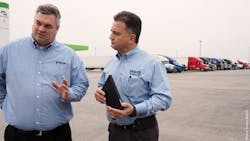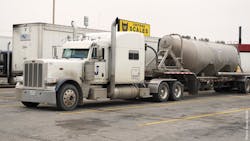Chris McElhaney boils the strategic planning for most truck stops today down to a single word: convenience, for truck drivers and fleets alike.
“They will do anything they can not to have to stop at three different places,” he explained to Fleet Owner.
For example, as general manager of the Flying J truck stop located on Foster Road outside San Antonio, TX, he’s hoping to add a tire shop to his facility in the near future – a key part of the new five year plan his parent company, Pilot Flying J (PFJ), announced last month.
McElhaney emphasized, however, that older truck stops like his location along Foster Road face some extra difficulties when trying to make such additions. “This is a 26-year old facility so we are constrained a bit by space,” he said, pointing out that his side is bordered a Speedco truck repair shop on one site and a hotel on the other.
Yet Marc Feole, Flying J’s region manager for south central Texas, stressed that building more amenities into truck stops – from a broader selection of fresh foods to higher quality showers and reserved parking options – remains a key strategic driver, so figuring out how to fit everything in remains critical.
“Think about when you travel,” he explained to Fleet Owner. “How many trips do you take when you don’t set up your hotel arrangements beforehand? For truck drivers, they start thinking about parking the minute they wake up. So we are doing everything in our power to let them know what parking we have in as ‘real-time’ as possible.”
Feole, who’s been with Flying J for a total of 20 years, stressed that truck drivers that frequent the south central Texas region tend to be out on the road 14 to 21 days at a stretch – long enough to where even small amenities take on greater importance.
“Think about being away from home that long and then having to wait in line for a shower; think about the lack of privacy,” he noted. “We go into a hotel room with a bathroom and shower to ourselves. A driver doesn’t get that. So we need it to be clean, no mildew, and of good quality.”
Aside from the need to refuel and park, the number one thing drivers want, Feole said, based on feedback comments, is a good shower.
“Now they also want good coffee and fresh food [and] our PJ Fresh [in-store delicatessen] is seeing a lot of demand especially for fresh fruit, eggs and salads,” he pointed out. “We’re continuing to introduce healthy food options as drivers are more health-conscious and there is more of a concern about driver weight and fitness.”
Ken Parent, PFJ’s president, noted in a conference call with reporters last month that, for truck stops today, it’s all about providing better options for truck drivers.
“How do we save drivers time? How do we make their day more productive? How do we save time fueling and get in and out of the store based on hours-of-service to meet delivery perspective?” he explained. “That’s why we’re trying to develop better and more ways to listen and address professional driver needs,” Parent emphasized. “They don’t want to get off interstate and drive though a truck stop only to find no parking is available” or there is no fresh food available.
He added that truck stops will also need to “customize” themselves after a fashion as well, since different parts of the country may experience greater or lesser need for specific services.
“In some cases there is a huge need for showers as relay teams favor certain parts of the country,” Parent noted. “You can’t take a ‘one-size-sits-all’ approach. You need to be more regionally and locally driven in terms of amenities you are trying to offer.”





